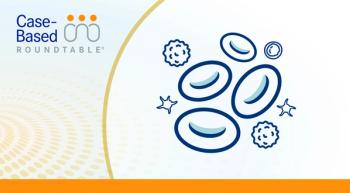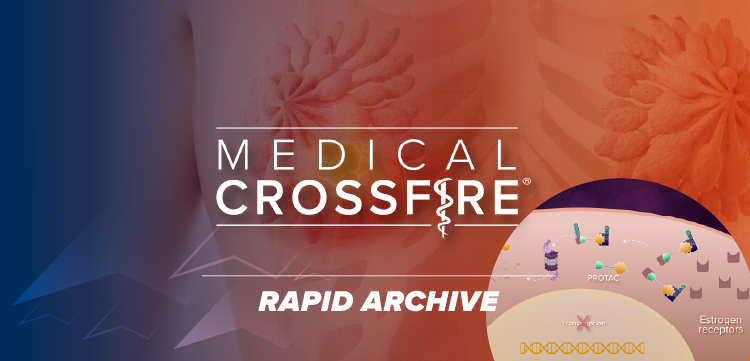
New Phase 1 Findings Show Promise of Cancer Vaccines in KRAS Mutations
In an interview with Targeted Oncology, Chris Haqq, MD, PhD, discussed the potential use of cancer vaccines in patients with KRAS-mutated pancreatic and colon cancer.
Innovative findings in the field of cancer vaccines were presented at the Society for Immunotherapy of Cancer (SITC), focusing on a novel technology directing vaccines into lymph nodes. The trial (NCT05726864), a first for this technology called ELI-002, included 20 pancreatic and 5 colorectal cancer patients with residual cancer post-local treatment.1,2
A 6-month vaccine course resulted in 77% of patients having reduced tumor markers, with 6 patients achieving complete responses.1 Notably, the technology induced both helper and killer T cells in over half the patients, offering a balanced response.
Long-term follow-up revealed sustained memory T cells in 75% of those included post-boosters. Moreover, a strong correlation emerged between above-median T-cell responses and reduced relapse, aligning with the therapy's goal.
Considering the limited drugs available in targeting KRAS mutations, especially in pancreatic and colorectal cancer, the vaccine's potential to address a broader spectrum of cancers offers hope. Inspired by a personal connection to KRAS-mutated colorectal cancer, Chris Haqq, MD, PhD, envisions significant impact with these agents moving forward.
In an interview with Targeted OncologyTM, Haqq, executive vice president, head of research and development and chief medical officer at Elicio Therapeutics, outlined the SITC presentation on ELI-002 and plans for future cancer vaccine development.
Targeted Oncology: Can you summarize the findings you presented at SITC?
Haqq: We sought to evaluate a new technology for cancer vaccines that can direct the vaccine into the lymph nodes. We think of the lymph nodes as the brain center for the immune response because that's where the coordination occurs between the antigen-presenting cells and the T cells that can go out from the lymph nodes and then migrate into the cancer and have their effect in eliminating the target cancer cells.
The trial that we conducted was the first trial of the evaluation of this new technology. We studied patients who had pancreatic, 20 of those patients, and 5 patients that had colorectal cancer after they completed local treatment, a combination of surgery and chemotherapy, and yet, unfortunately, remained positive for residual cancer that was detected either on a circulating tumor DNA test, or by progressively rising values of the tumor protein markers, like CA 19-9 or carcinoembryonic antigen. It's in those patients that we gave a 6-month course of treatment with the new vaccine, divided into an initial group of priming doses, and then a series of boosters. We continued to follow the patients for 2 years after they had received the new agent, with an eye towards seeing, first, the safety, then taking a look at the T-cell induction from the administration of the new agent. The longest follow-up looked at whether the patients had any relapses or whether they remained free from their cancer.
We were excited to find that in the study,about 77% of the patients reduced their tumor markers, so they were either ctDNA or tumor proteins.In fact, 6 of the patients cleared their cancers, sothat's a good proportion of the patients that were able to eliminate that. The patients who we saw that initial evidence of the drug’s antitumor effect in were the same people that made very large T-cell responses.
[There are some] key observations here that are a little bit different than many other past cancer vaccines. First, the higher proportion of responding patients. In past technologies, no more than about half of patients have been making T-cell responses to vaccines like this. Since we have more than three-quarters of patients responding, it seems to be that there's some considerable promise from this new approach. In addition, there are 2 types of T cells that we'd like to bring out. There are a group called CD or helper cells, and a group called killer cells. Our technology platform is able to make both of those in more than half the patients. That's a balanced response that we haven't seen before with alternative technologies that were used in the past.
What other findings were observed with longer follow-up?
Another focus of the SITC data was to take a look with longer follow-up and see how well the patients were able to maintain the induced T cells. In fact, we saw that the T cells that formed after the vaccine’s administration are long lived. They formed what's called a memory compartment. The memory T cells remained present and, in fact, kept increasing, in three-quarters of the patients after the boosters were given.
The most exciting part of all of this was to see the relapse-free survival and how that dovetailed with the T-cell responses. We saw a strong correlation there. When we divided the group into those who had above-median T-cell response, so the highest half of the T-cell responses, there was only 1 patient that had a tumor progression, and all the other patients remained free from the progression, whereas in the lower T-cell group, there were many patients that progressed. The data suggests that the mechanism of action of our drug correlates with a reduction in relapse, which is the goal of our therapy.
It's an exciting time for us, and I think for cancer vaccines as a field in general, because there's several other recent reports where the more potent technologies that are coming online now are able to provide more clear signals of benefit.
What unmet needs still remain in this population?
There are, so far, only small molecule drugs approved that can target the KRAS mutations that occur on patients for 1 of the mutations that G12 to 16 gene change. Unfortunately, that's uncommon in pancreatic and colorectal cancer, the 2 cancer types which we studied, making up around only 1% to 2% of all the patients in pancreatic cancer, for example. Overall, about 88% of patients with pancreatic cancer have 1 of the RAS mutations. But unfortunately, there's no treatment for 86% of them. We're excited that the cancer vaccine approach could be able to address the much broader spectrum of KRAS mutations that occur in patients.
The reason that I joined Elicio was in part because my father had KRAS-mutated colorectal cancer. Unfortunately, he ended up passing from it with a brain metastasis. The T cells are 1 of the only tools in our arsenal as oncologists that are able to cross the blood brain barrier and get in there. I was strongly inspired by what happened to my own family to make sure we went and brought this product into development. It's exciting that even this initial data from the phase 1 trial shows that we look like we're on the right path here to be able to help people just like my dad.
What are the next steps?
We’re excited to open a randomized cohort. A randomized phase 2 [study] will proceed from the observations that we've made here. It will enroll about 135 patients, and they will be randomized in a 2:1 fashion. So, 90 patients will receive the ELI-002 and a group of 45 will initially be observed, which is the current standard approach for patients in this situation. They're not typically given chemotherapy until there's a radiographic scan showing the return of the cancer. We're conducting our study in a sort of a window of opportunity when there's no known effective treatment. This study is also designed to allow for a crossover. If the patients who are initially observed do experience radiographic relapse, imaging findings indicating the return of their cancer, they can elect at that time to crossover and receive the cancer vaccine. ELI-002 will hopefully be of help in that setting as well with bulkier cancer.
We presented on additional cancer vaccines targeting additional mutations. One is BRAF, and there's a common mutation that occurs there at this 600th amino acid. That's a mutation that's common in colon cancers, melanomas, and some lung tumors. In addition, we presented the preclinical proof of concept for a P53 vaccine and P53 is, unfortunately, an even more commonly mutated gene than KRAS is. These mutations are present in around 30% of cancer patients and 60% of cancer patients have some abnormality in the P53 pathway. We’re excited to see and present that the preclinical findings with these 2 new vaccine candidates are as strong or maybe even stronger than the results that we had preclinically with the KRAS vaccine that's now showing its clinical proof of concept.













































